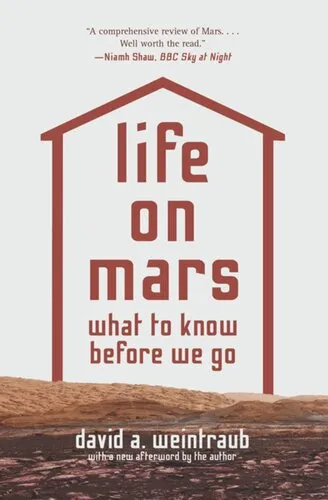Life on Mars: What to Know Before We Go
4.2
بر اساس نظر کاربران

شما میتونید سوالاتتون در باره کتاب رو از هوش مصنوعیش بعد از ورود بپرسید
هر دانلود یا پرسش از هوش مصنوعی 2 امتیاز لازم دارد، برای بدست آوردن امتیاز رایگان، به صفحه ی راهنمای امتیازات سر بزنید و یک سری کار ارزشمند انجام بدینکتاب های مرتبط:
معرفی کتاب «Life on Mars: What to Know Before We Go»
کتاب «Life on Mars: What to Know Before We Go» نوشته دیوید ای. واینتراب، اثری عمیق و جامع درباره یکی از مهمترین سوالات علمی و فلسفی تاریخ بشر است: آیا حیات در مریخ امکان دارد؟ این کتاب با بهرهگیری از زبان ساده و شفاف، مخاطبان را به یک ماجراجویی علمی-تخیلی واقعی میبرد و اینکه قبل از هر اقدامی برای سکونت انسان در مریخ، چه چیزهایی باید بدانیم. واینتراب با استفاده از تحقیقات علمی پیشرفته و دادههای جاری از فضاپیماها و تلسکوپها، زمینهای برای تفکر در مورد آینده بشر و جایگاه ما در کیهان فراهم میکند.
خلاصهای تفصیلی از کتاب
این کتاب به چهار موضوع اصلی میپردازد: تاریخچه مطالعات مریخ، تحلیل شرایط فیزیکی و شیمیایی آن، بررسی پتانسیل حیات روی این سیاره، و چالشهای اخلاقی و عملی برای سکونت انسان در آینده. واینتراب در این مسیر از سوالات اساسی شروع میکند: آیا در گذشته مریخ میزبان زندگی بوده است؟ اگر بوده، چه شد که حیات از آنجا محو شد؟ آیا اکتشافات فعلی، مانند دادههای Mars Rover و تحقیقات ناسا، میتوانند پاسخهایی قطعی به ما بدهند؟ نویسنده همچنین به توسعه فناوریهایی مانند پرتابگرهای موشکی، سیستمهای زیستی و برنامههای بلندپروازانه SpaceX برای سفر انسان به مریخ اشاره دارد.
علاوه بر این، یک بخش ویژه از کتاب به تفکر درباره پیامدهای اخلاقی یافتن زندگی دیگرجا اختصاص دارد. اگر نشانههای حیات را پیدا کنیم، آیا باید مریخ را برای خودمان استعمار کنیم؟ یا باید آن را به همان شکلی که هست، دستنخورده باقی بگذاریم؟ این سوالات، بهویژه با توجه به اینکه مریخ ممکن است تنها خانه دیگری باشد که ما در منظومه شمسی پیدا میکنیم، اهمیت فراوان دارند.
آموختههای کلیدی کتاب
- علم پشت مطالعات مریخ: این کتاب ابزارهایی را برای فهم تحقیقات پیشرفته اخترشناسی و علوم سیارهای در اختیار میگذارد.
- چالشهای عملی سفر به مریخ: از محدودیتهای فنی تا خطرات زیستی و روانی برای فضانوردان.
- ابعاد اخلاقی کشف حیات: اگر اثری از حیات میکروبی روی مریخ پیدا شود، آیا باید مداخله کنیم؟
- تصویر بزرگتر کیهان: انسان چگونه میتواند جایگاه خود را در میان ستارگان درک کند؟
جملات مشهور از کتاب
"The question of life on Mars is not just about science; it is about who we are and what we want to become as a species."
"Mars teaches us humility. It shows us our limits, but also the boundless curiosity that defines humanity."
"Exploring Mars is not just about technology; it is about understanding our responsibility to the cosmos."
چرا این کتاب مهم است؟
این کتاب ما را به تفکر درباره چالشهای بزرگ پیش روی ما دعوت میکند و نقش بشر را بهعنوان گونهای هوشمند در بررسی جهان مشخص میکند. اهمیت آن فقط در اطلاعات علمی و تاریخی نیست، بلکه در ترجیحدادن پرسشهایی است که درباره اخلاقیات، آینده زمین و جایگاه ما در میان اجرام آسمانی مطرح میکند. «Life on Mars: What to Know Before We Go» کتابی برای کسانی است که به علم، فلسفه، و آیندهنگری علاقهمند هستند. این اثر نه تنها به خواننده دانش میدهد، بلکه او را تشویق میکند تا پرسشهای بزرگی را درباره جایگاه انسان در جهان مطرح کند. اگر به دنبال درکی عمیقتر از معنای بشری بودن و ارتباط ما با کیهان هستید، این کتاب نقطه شروع خارقالعادهای است.
Introduction to 'Life on Mars: What to Know Before We Go'
The tantalizing question of whether life exists beyond our planet has captured human curiosity for centuries. David A. Weintraub's book, Life on Mars: What to Know Before We Go, takes readers on a fascinating journey through science, history, and ethical considerations to explore one of the most profound questions of our time: Are we alone in the universe?
This book goes beyond the surface of Mars to examine what it truly means for humankind to venture to another planet. With meticulous research and an engaging narrative, Weintraub combines scientific discoveries, philosophical queries, and practical questions about human exploration. Whether you are a science enthusiast, space aficionado, or simply curious about humanity's potential future on Mars, this book is a treasure trove of insights.
A Detailed Summary of the Book
In Life on Mars: What to Know Before We Go, Weintraub lays a comprehensive foundation for understanding Mars exploration. The narrative begins with the historical fascination with the "red planet," from ancient civilizations identifying Mars in the night sky to telescopic observations in the 18th and 19th centuries that turned conjectures about Martian canals into popular culture lore.
The book then dives into modern scientific discoveries, including the Viking missions of the 1970s that searched for microbial life and the more recent rovers that have analyzed Martian soil and atmosphere. Weintraub meticulously unpacks the science behind these explorations while highlighting unanswered questions, such as whether water—the key ingredient to life—exists in conditions that could foster biology.
However, the book is far from a cold, technical overview. It also addresses the human aspect of Mars exploration. Weintraub discusses the ethical dilemmas associated with visiting or colonizing the planet, particularly if microbial life already exists there. Should humans risk contaminating another world with our own biology? These questions force readers to confront whether scientific achievement justifies potential harm to extraterrestrial ecosystems.
Finally, Weintraub considers the practical implications of humans living on Mars. From the engineering challenges of building life-supporting habitats to the psychological toll of interplanetary travel, this book delivers a sobering yet hopeful perspective on our aspirations to become an interplanetary species.
Key Takeaways
- Understanding Mars: The book provides a detailed history of humanity's knowledge about Mars and the scientific breakthroughs that have brought us closer to understanding its potential for life.
- Ethical Considerations: Weintraub challenges readers to think deeply about the moral and ethical issues related to exploring and, potentially, colonizing Mars.
- Human Resilience: The logistical challenges of space travel and colonization are elucidated, offering an inspiring outlook on human ingenuity and determination.
- The Broader Implications: The book encourages readers to reflect on humanity's place in the universe and what Mars exploration could mean for our identity as a species.
Famous Quotes from the Book
"Mars is not just another destination in the cosmos; it is a mirror reflecting our deepest hopes, fears, and ambitions."
"If microbial life exists elsewhere, we must reconsider what life means and whether it is distinctly Earth-bound."
"The journey to Mars is not merely a physical one; it is laden with philosophical and ethical weight that humanity cannot ignore."
Why This Book Matters
David A. Weintraub’s Life on Mars: What to Know Before We Go matters because it transcends the boundaries of traditional space exploration literature. The book is a timely and thought-provoking piece that speaks to our generation's aspirations to explore beyond Earth. Weintraub's approach is both rigorous and accessible, balancing hard science with narrative storytelling to engage readers of all backgrounds.
Mars exploration is not solely a scientific endeavor; it is a reflection of human curiosity, ambition, and the search for meaning. This book invites readers not just to learn about Mars but to question their own perspectives on life, existence, and responsibility as a species. Whether you dream of a future where humans live on the red planet or remain skeptical of our ability to do so, this book offers critical insights and challenges assumptions that shape our understanding of the final frontier.
In an era where space travel is becoming increasingly plausible, Life on Mars: What to Know Before We Go is a vital guide for anyone contemplating the broader implications of humanity’s next great adventure.
دانلود رایگان مستقیم
You Can Download this book after Login
دسترسی به کتابها از طریق پلتفرمهای قانونی و کتابخانههای عمومی نه تنها از حقوق نویسندگان و ناشران حمایت میکند، بلکه به پایداری فرهنگ کتابخوانی نیز کمک میرساند. پیش از دانلود، لحظهای به بررسی این گزینهها فکر کنید.
این کتاب رو در پلتفرم های دیگه ببینید
WorldCat به شما کمک میکنه تا کتاب ها رو در کتابخانه های سراسر دنیا پیدا کنید
امتیازها، نظرات تخصصی و صحبت ها درباره کتاب را در Goodreads ببینید
کتابهای کمیاب یا دست دوم را در AbeBooks پیدا کنید و بخرید



